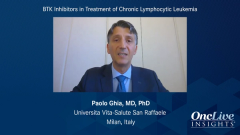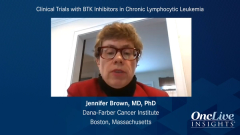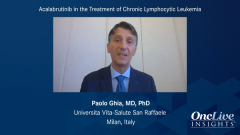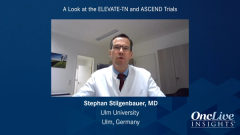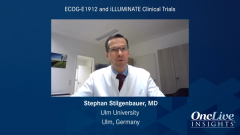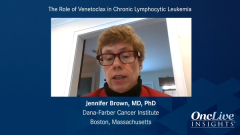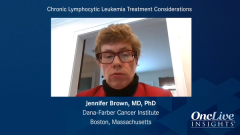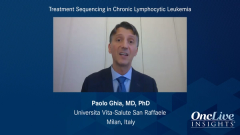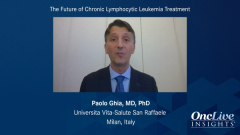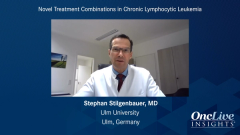
The Future of Chronic Lymphocytic Leukemia Treatment
Dr Ghia discusses emerging treatment strategies, including some promising clinical trials in chronic lymphocytic leukemia.
Episodes in this series

Paolo Ghia, MD, PhD: With so many different options, one challenge is how to sequence them. But another dilemma we will be facing is how to combine them because the idea in the future is the more that we can combine, the more effective these novel drugs are in order to achieve a time-limited treatment where a patient can discontinue the treatment based on the quality of their response.
In the case they do not achieve enough undetectable MRD [minimal residual disease], for example, they could continue treatment indefinitely as we are doing now, but that would be only for a small portion of patients. This is now being explored in many different clinical trials combining BTK [Bruton tyrosine kinase] inhibitors and BCL2 inhibitors plus or minus an anti-CD20 antibody, for example, which is typically obinutuzumab. On one side, we have the CAPTIVATE study combining ibrutinib with venetoclax in the first-line setting, but we also the AVO study where acalabrutinib is combined with venetoclax plus obinutuzumab. There is also a study by the general CLL study group, which is CLL13, that is comparing the triple combination of venetoclax, ibrutinib, obinutuzumab to venetoclax plus rituximab…and FCR [fludarabine, cyclophosphamide, rituximab] or BR [bendamustine, rituximab] as the standard arm.
We will know about these results of course. We are putting together all the different options of the drugs that we have. We know from a study published from [The University of Texas] MD Anderson [Cancer Center] in The New England Journal of Medicine recently where they explored ibrutinib plus venetoclax in the first-line setting, and they showed that up to 70%, 69% of the patients can achieve undetectable MRD. So it is much more than what we see in patients on venetoclax plus obinutuzumab, for example. Even if we cannot compare different studies, the message is still that not all patients will achieve undetectable MRD, so these patients will probably still benefit from exogenous treatment. All the other patients can indeed stop the treatment.
We also have other options because, as we mentioned, BTK inhibitors can be not so well tolerated as in the case of ibrutinib, so we have the second-generation acalabrutinib but also zanubrutinib, which both tend to have a much safer profile. On the other side, given the mechanism of action of all of these 3 molecules regardless of being first or second generation, the leukemia can develop in patients in the BTK molecules, particularly in the binding pockets for the different inhibitors, and therefore, the leukemia becomes refractory and resistant.
We now have a third generation of BTK inhibitors that has been developed in order to inhibit the mutated form of BTK, but it is also active on the wild type for BTK of course. This is the next generation of molecules we can think about, with LOXO-305 and ARQ-531, which are 2 different third-generation BTK inhibitors that are being explored in phase 1 and 2 studies that both show high efficacy in the setting of patients with BTK mutations in whom we achieve clinical responses. They also showed a different toxicity profile compared to the first and second generations of BTK inhibitors. Apparently they are much better tolerated. Of course, the number of patients is limited at the moment, so we have to wait for higher accrual of patients. We need more experience and more follow-up to be sure that the toxicity profile is completely different. But the data are showing they are active on the mutated from of BTK, so quite reassuring that in the future we may have another option to rescue patients who become refractory to ibrutinib, acalabrutinib, or zanubrutinib so that we can still treat the patient with the same class of drug without moving to BCL2 inhibitors, for example.
In terms of BCL2 inhibitors, we know that patients can also develop mutations in the BCL2 gene, and therefore, they become resistant to venetoclax. The resistance can also be due to an increased level of Mcl-1, so there are also a number of studies that are exploring the possibility of inhibiting Mcl-1 as another anti-apoptotic gene, so in the future, that may also be another option that we will hopefully add to our armamentarium.
We also have other combinations that are interesting with venetoclax to achieve much deeper responses. This is in the relapsed/refractory setting where the combination of umbralisib, ublituximab, and venetoclax is explored with the idea of possibly achieving deeper responses in order to discontinue therapy.
Above all, last but not least in CLL, there is a lot of enthusiasm regarding the CAR [chimeric antigen receptor] T-cell therapy, so modified T cells with anti-CD19 CARs. CLL has been the first disease in which there has been a published study showing the efficacy of CAR T cells. CLL is definitely a much more difficult disease. Though the first study published on CAR T was for CLL, there is no CAR T-cell therapy approved yet for the simple reason that CLL is characterized by immunosuppression, and immunosuppression also impacts the efficacy of the CAR T cells. We have a number of issues. We now have studies that are exploring the possibility of modifying the T cells, like adding ibrutinib before and after the CAR T-cell therapy to improve the efficacy and decrease the energy that the T cells can encounter when they are in a patient with CLL. The TRANSCEND CLL004 study with lisocabtagene maraleucel is being explored in the relapsed/refractory setting plus or minus a BTK inhibitor.
Transcript edited for clarity.




